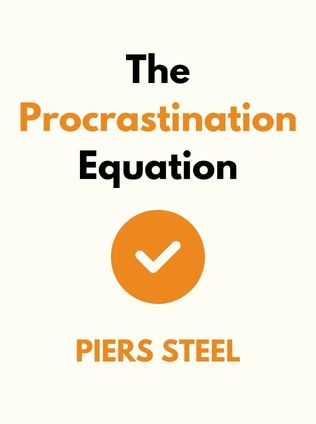
The Procrastination Equation
How to Stop Putting Things Off and Start Getting Stuff Done
By Piers Steel
Published 01/2010
About the Author
Piers Steel, Ph.D., is an internationally recognized expert on procrastination and motivation. His academic journey culminated in a doctorate in industrial/organizational psychology, and he currently holds the prestigious title of Distinguished Research Chair at the University of Calgary. Steel’s research has been featured in prominent publications such as Psychology Today, Good Housekeeping, and The New Yorker, making him one of the foremost authorities on procrastination. His dedication to this field is also evident in his creation of the Procrastinus website, which serves as a valuable resource for those seeking to understand and combat procrastination.
Steel’s work is grounded in extensive research and real-world applications, making his insights both scientifically sound and practically useful. His ability to distill complex psychological concepts into actionable advice has helped countless individuals overcome the procrastination that plagues them. In The Procrastination Equation, Steel not only shares his findings but also offers a comprehensive guide for those looking to reclaim control over their time and productivity.
Main Idea
Procrastination is a universal challenge, affecting nearly 95% of people, with 25% acknowledging it as a significant trait. In The Procrastination Equation, Steel delves into the science behind this pervasive habit, offering a unique equation that predicts procrastination based on four key factors: the probability of success, the value of the task, the immediacy of the reward, and one’s sensitivity to delay. By understanding these factors, individuals can identify why they procrastinate and employ targeted strategies to overcome it.
The book is more than just a theoretical exploration; it’s a practical guide that equips readers with the tools they need to increase their motivation, reduce distractions, and build the confidence necessary to tackle even the most daunting tasks. Steel’s approach is holistic, addressing not just the symptoms of procrastination but also the underlying psychological mechanisms that drive it.
Table of Contents
- Understanding Procrastination
- Reasons for Procrastination
- The Procrastination Equation
- Negative Consequences of Procrastination
- Strategies to Overcome Procrastination
- Conclusion
Understanding Procrastination
Procrastination is a complex behavior that involves delaying tasks despite knowing that doing so will likely lead to negative consequences. Steel defines procrastination as a voluntary delay of an intended action, even when we know that delay will likely make our situation worse. This behavior is common across all age groups and professions, affecting everyone from students to CEOs.
At its core, procrastination is a form of self-regulation failure, where individuals struggle to align their actions with their intentions. This struggle often results in a cycle of delay, guilt, and stress, which can have far-reaching effects on both personal and professional lives.
"Procrastination is the voluntary delay of an intended course of action despite expecting to be worse off for the delay." - Piers Steel
Steel’s definition highlights the irrational nature of procrastination. We know that putting off a task will make it more difficult and stressful later, yet we do it anyway. This paradox is at the heart of why procrastination is such a frustrating and pervasive problem.
Reasons for Procrastination
Understanding why we procrastinate is the first step in overcoming it. Steel identifies three primary reasons for procrastination:
- Choosing instant gratification over long-term gain
- Disliking the task
- Fear of failure
Reason 1: Choosing Instant Gratification Over Long-Term Gain
Humans are naturally inclined to favor immediate rewards over future ones, a tendency that Steel argues plays a substantial role in procrastination. This preference is rooted in our evolutionary history, where immediate rewards were often crucial for survival. However, in modern society, this tendency can lead to problems, particularly when it comes to long-term goals.
For example, consider the case of a student who knows they should study for an upcoming exam but instead chooses to watch TV. The immediate pleasure of entertainment outweighs the abstract benefit of studying, leading to procrastination. This preference for short-term rewards can be especially problematic in situations where the consequences of delay are significant, such as in professional or academic settings.
"We choose immediate rewards over future gains, often to our detriment." - Piers Steel
Steel explains that this tendency is exacerbated by the abstract nature of future rewards. When a reward is distant, it feels less real and less motivating. This is why deadlines that are far off in the future often lead to procrastination; the task feels less urgent, and the reward for completing it seems remote.
This tendency to discount the value of future rewards is known as temporal discounting, and it’s a key factor in procrastination. The more we discount the future, the more likely we are to procrastinate. Understanding this psychological bias is crucial for developing strategies to counteract it.
Reason 2: Disliking the Task
The second reason Steel identifies is the natural human aversion to tasks that are unpleasant, tedious, or boring. When we don’t enjoy a task, it’s easy to put it off in favor of something more enjoyable. This is why so many people procrastinate on tasks like filing taxes, cleaning, or completing paperwork.
Sign up for FREE and get access to 1,400+ books summaries.
You May Also Like
The Subtle Art of Not Giving a F*ck
A Counterintuitive Approach to Living a Good Life
By Mark MansonRich Dad Poor Dad
What the Rich Teach Their Kids About Money - That the Poor and Middle Class Do Not!
By Robert T. KiyosakiHow To Win Friends and Influence People
The All-Time Classic Manual Of People Skills
By Dale CarnegieFreakonomics
A Rogue Economist Explores the Hidden Side of Everything
By Steven D. Levitt and Stephen J. Dubner



















